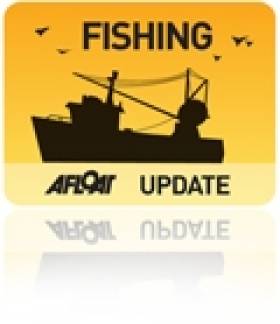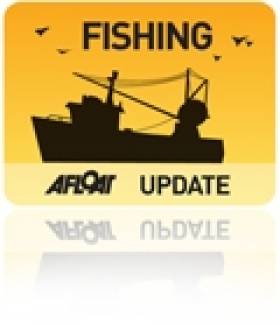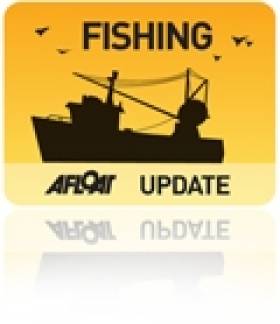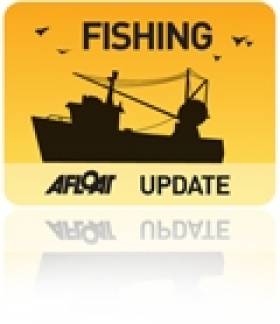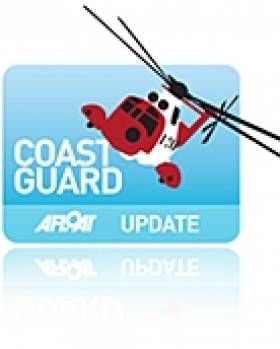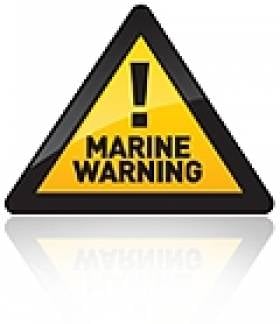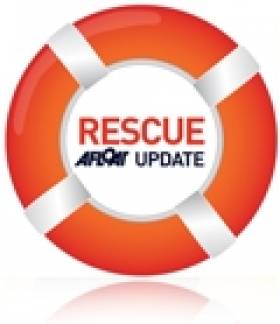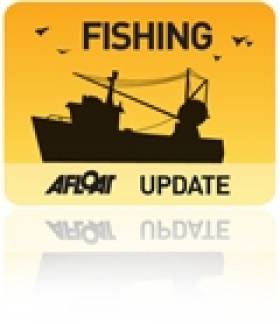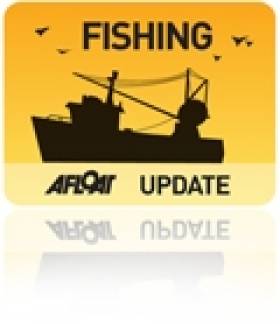Displaying items by tag: Fishing
Licence Application for Aran Islands Fish Farm 'To Be Lodged in January'
#FISHING - The licence application for a proposed new deep-sea fish farm in the Aran Islands is expected to be lodged in January.
As previously reported on Afloat.ie, Bord Iascaigh Mhara's (BIM) planned 15,000-tonne organic salmon farm off Inis Oírr would be the largest of its kind in Europe, and would create hundreds of jobs in the area.
Commenting on the plans, Galway West Senator Fidelma Healy Eames said it was "a major opportunity for Galway and would represent a very significant economic boost for our coastal communities."
She added: "Deep sea fish farming has proven to be very economically beneficial in countries such as Norway, Chile and Scotland. It is timely that Ireland would capitalise on our fantastic marine resources as these countries have."
According to Healy Eames, the project is expected to "meet all environmental standards and will be barely visible from 2km away and effectively not visible from land.
"It would take up a negligible amount of inshore fisheries ground in the bay (0.22%) and would not interfere with existing fishing routes or Galway Bay ferry routes."
Ireland Catches Record EU Fisheries Deal
#FISHERIES – There has been a record outcome for Ireland at EU Fisheries negotiations with a total Value of 2012 Fishing Opportunities of €250 million it was announced early this morning.
Following the conclusion of lengthy and complex EU fisheries negotiations the Minister for Agriculture, Food and the Marine, Simon Coveney TD, said "I am delighted at the outcome of these negotiations which delivered my key priorities and will allow the Irish fishing fleet to look forward to 2012 with optimism. The measures agreed in these negotiations will maximise employment and economic activity in our coastal communities." The Minister said that he had secured "141,000 tonnes of pelagic and tuna quotas and 36,000 tonnes of whitefish. I am satisfied that this will provide an excellent range of opportunities for our fishing industry in 2012."
Minister Coveney was speaking after three days of intensive negotiations, which concluded in the early hours of this morning. The Minister described the Council as "very challenging" and said that "my priority from the outset was to achieve an outcome that protected the Irish fishing industry while respecting the most up-to-date scientific data for priority stocks of critical importance to our fleets."
Mr Coveney described the reopening of the Irish Sea prawn fishery as "a very significant hard-won achievement, which will allow Irish fishing vessels to return to this important fishery immediately." This fishery had been closed in mid-October and was due to remain closed until 1 February 2012 but will now reopen after Minister Coveney secured additional fishing effort entitlements for the Irish fleet.
The Minister highlighted the agreement on total allowable catches (TACs) and quotas in 2012 on a number of species of particular economic importance to the Irish industry including the agreement to maintain quotas of prawns in the Irish Sea and off the south and south-west coasts. This fishery is estimated to be worth €52 million in 2012.
Mr Coveney said that "there is very good news for the fisheries along the south coast". The Irish quota for cod in the Celtic Sea is increasing by 77 per cent. He said that the Commission accepted the strong case he made for an increase in quotas for haddock and whiting in the Celtic Sea of 25 per cent and 15 per cent respectively which the Minister said "were entirely justified on the scientific data which I presented to the Commission." The original Commission
proposal was for a 25 per cent reduction in both stocks. The Minister said that the increases in these quotas would be worth an extra €3.5 to the south coast fishing industry. In addition, this morning's agreement ensures that quotas for Pollock and Saithe in the Celtic Sea will remain at existing levels next year. A very positive element in securing the future of these fisheries was the commitment to adopt new measures to reduce discarding of small fish in the Celtic Sea.
In addition, the Irish quota for Celtic Sea herring is increasing from 11,407 tonnes to 18,236 tonnes, a 60 per cent increase. "These are valuable quota increases and will support additional onshore employment in the processing industry." The Minister noted this increase was due to conservation measures in the Celtic Sea and responsible conservation management in recent years in partnership with the industry.
The Minister also negotiated a very significant increase in the Irish quota of 155 per cent for the spring Boarfish fishery off the south-west coast. This quota, which the Minister described as "a new and very exciting fishery" will increase from 22,227 tonnes to 56,666 tonnes.
There is a very significant increase of 200 per cent in the haddock quota off Donegal. There is also agreement that the Commission would bring forward new rules by the middle of February to assist catching of this greatly increased quota.
Mr Coveney recognised the position in relation to cod in the Irish Sea and accepted the proposal to reduce the TAC for 2012 by 25 per cent. "This approach is consistent with scientific advice and adherence with the Long Term Management Plan, which is designed to ensure that the stock recovers to sustainable levels in the future. This is vitally important from both an industry and conservation perspective."
The important €9 million quota for the Albocore Tuna summer fishery, off the south-west coast, has been increased by 342 tonnes to 3,896 tonnes for 2012. The Blue Whiting quota for the spring fishery, off the north-west coast, has increased from 1,187 tonnes this year to 7,498 tonnes for 2012.
From the outset of the negotiations an absolute priority for Ireland was the satisfactory application of the Hague Preferences, which are of crucial, political economic importance for this country and have been successfully protected.
Finally, Mr Coveney said he was satisfied that Ireland had achieved what was necessary in this year's negotiations to provide significant opportunities for the fishing industry and coastal communities around the country and will protect our fishing stocks for future sustainability.
Minister Shows Displeasure With Euro Fishery Plans
#FISHING - The Minister for the Marine has spoken out over plans by the European Commission to make cuts in certain fish stocks that could see €65 million in lost earnings for Ireland's fishing fleet.
According to The Irish Times, Minister Simon Coveney said there was "very credible data prepared by the Marine Institute to back up" the case against proposals by EU maritime affairs commissioner Maria Damanaki to cut certain stocks by as much as 25%.
He told the paper he would "challenge anyone to say we are not sticking with scientific advice", and also suggested that the fishing industry is being more responsible in its own proposals.
"The European Commission is recommending a 60 per cent increase in the total allowable catch for Celtic Sea herring, whereas the industry is seeking 30 per cent as a more responsible approach,” said Minister Coveney.
“So this shows it is not true to say that fishermen are irresponsible, as some would suggest."
EU fish talks continue today in Brussels. The Irish Times has more on the story HERE.
Public Needed to Help Record Whale and Dolphin Strandings in UK
#MARINE WILDLIFE - Some 46 reports of stranded whales and dolphins in Northern Ireland are among the thousands recorded across the UK over the last six years, according to BBC News.
A new study co-ordinated by the Zoological Socoety of London (ZSL) shows that some 3,500 cetaceans were stranded on the British coastline between 2005 and 2010.
Though year-on-year figures have fallen overall, is presumed that many more strandings have gone undetected.
Many were found to have died of disease or starvation – particular harbour dolphins.
But human activity such as fishing, shipping and chemical pollution also poses a significant threat to marine wildlife in the waters around the British Isles, said Rob Deaville of the ZSL.
The public is being encouraged to report stranded marine mammals to help create a more accurate picture.
BBC News has more on the story HERE.
Europe's Largest Organic Fish Farm Proposed for Aran Islands
#FISHING - Bord Iascaigh Mhara (BIM) has begun the consultation process for a proposed new deep-sea fish farm in the Aran Islands, The Irish Times reports.
The 15,000-tonne organic salmon farm would be located off Inis Oírr on a 500-hectare site in Galway Bay, and would be one of the largest of its kind in Europe.
Approval of the project could see the creation of 350 direct and 150 indirect jobs, says BIM. It will be owned by the body on behalf of the State but leased to operators on a franchise basis.
The scheme has been welcomed by Comhar Caomhán Inis Oírr, but the island co-op said it was important that a promised €8-million pier for the island is constructed first to provide the necessary infrastructure.
The Irish Times has more on the story HERE.
Fishing Vessel Runs Aground at Ardglass Harbour
The 15 metre vessel was returning from a fishing trip when it hit the rocks. With the vessel listing at 30 degrees they broadcast a mayday alert on Channel 16 before the four crew took to the life raft. They were rescued from there by another fishing vessel 'The Three Coins'.
All four crew were brought ashore at Ardglass Harbour safe and well where the South Down Coastguard Rescue Team met them. The damage to the 'Moyuna' is now being assessed.
Belfast Coastguard Watch Manager Alan Pritchard said:
"The crew did exactly the right thing in calling for assistance and taking to the life raft to wait for help to reach them.
"The MAIB have been informed and they will be investigating the circumstances that led to tonight's grounding. MCA's surveyors are also aware."
Marine Notice: Drilling Off South Coast
#MARINE WARNING - The latest Marine Notice from the Department of Transport, Tourism and Sport (DTTAS) advises that offshore drilling has commenced off the south coast.
The semi-submersible drilling unit Arctic III (callsign YJSU9) will be drilling some 65km south of Roches Point, Co Cork, for a period of approximately three months.
The drilling unit will have a dedicated stand-by safety vessel and supply vessel, both listening on VHF channel 16 throughout the project.
All vessels, particularly those involved in fishing, are urged to give the drilling unit and its handling vessels a wide berth of at least 500 metres and to keep a sharp lookout in the area.
Full location co-ordinates and further details are included in Marine Notice No 53 of 2011, a PDF of which is available to read and download HERE.
Fisherman on Spanish Boat Airlifted to Cork
The skipper of the fishing vessel Albelo Primero radioed the Irish Coast Guard's Marine Rescue Co-ordination Centre on Wednesday night, reporting that a 33-year-old crewman had taken ill and required emergency medical attention.
The man was airlifted by coastguard helicopter to Cork Airport and transfered by ambulance to Cork University Hospital.
The Irish Times said his condition is not understood to be life-threatening.
The Marine Institute and BIM produced the "Discard Atlas" – which is a detailed compendium of discards by the Irish Fleet on a stock by stock and area by area basis. The Atlas also outlines a range of potential measures to help reduce discarding. The "Discard Atlas - scientific observations and potential solutions" was compiled with the support of Irish Industry, to inform the EU wide discard debate, to identify where action needs to be taken and to inform on the appropriate measures.
Commenting on the Atlas Minister Coveney said "Ireland has now taken the lead in the debate on discards and this Atlas will inform the process to achieve real change and a significant reduction in discarding within the new Common Fisheries Policy". Minister Coveney emphasised that "discarding is an EU wide issue, not just an Irish issue. While the Atlas highlights discarding in the Irish fleet, all Member States fishing these stocks, do so at the same time, using similar gears and under the same market conditions. While there may be some differences, overall the discard trends will be similar for all".
In calling for all Member States to publish their figures, the Minister said "I have consistently said that discarding is a complex issue and the debate must be informed by all the scientific facts, so we can better understand the issues and identify potential solutions". The information provided in the Atlas is based on information that is collected by all Member States. However, the international data has not been compiled into an Atlas format. Minister Coveney said " It is only when the full extent of the available international data are compiled can we collectively make informed decisions on a coherent EU wide discard policy, underpinned by a focussed suite of measures to significantly reduce and ultimately eliminate discards. The information contained in the Atlas re-enforces my long held view that we need to tackle the discard problem on a stock by stock and fishery by fishery basis, and not by a blunt simplistic blanket ban which will be difficult to enforce".
The Atlas states that in a review of world discarding, the UN noted that the northeast Atlantic has the second highest discard level in the world, estimated to be 1.3 million tonnes, the majority being attributed to EU fisheries. The extent of discarding varies and where international data are available, the picture is mixed. In the Celtic Sea, international discarding of haddock was 12,400 tonnes (56% by weight) in 2010. In the Irish Sea; an average discard rate of 30% for haddock associated with Irish vessels is in line with other countries. However, there are cases where Ireland makes a very minor contribution to overall international discarding; for example in 2010, 1,183t of Cod was discarded in the North West fishery (area Via), yet Ireland contributed to less than 1% of this.
Minister Coveney said that "I want to commend the Irish industry in their decision to support this project, and acknowledge that they have already been pro-active in bringing forward proposals to reduce discarding of, Cod, Haddock and Whiting in the Celtic Sea. I intend to build on this good work by asking the Irish Fisheries Science Research Partnership (IFSRP) to look at the matter in light of the new Atlas information and explore the possibility of coming forward with further ambitious discard mitigation measure. It is only by this type of cross industry co-operation that a comprehensive set of proposals for dealing with the EU wide discarding problem can be designed and implemented, and I call on other Member States to follow the Irish lead and publish the full details of their discards so that our common goal for the elimination of discards can be realised."
Fishing Vessel Skipper Pleads Guilty
On 3rd January 2011 the UK registered fishing vessel 'Karen' was returning from a day's fishing in the Irish Sea when it grounded on the rocks at the North entrance to the port of Ardglass.
The vessel asked for urgent assistance from the Coastguard and the lifeboat from Portaferry was requested to launch to their aid. Because the weather was fair they were able to bring the crew ashore to Ardglass and to put pumps aboard the stricken vessel. The boat was later re-floated as the tide rose, however it sustained serious damage to the bow and keel.
At the Magistrate's Court in Downpatrick on 7th November 2011, skipper Simon Wills pleaded guilty of failing to properly navigate his vessel and to employing crew who were not qualified and did not meet the requirements of the fishing vessel safety training regulations
Mr Wills was fined a total of £600 and ordered to pay £1,250 to the RNLI.
On summing up the Magistrate Brian Archer said,
"It was fortunate that no one was injured."
Captain Bill Bennett, Area Operations Manager (Survey and Inspection) Belfast, for the MCA stated that
"This was a serious breach of the fishing vessel safety training regulations and once again reminds all fishermen of the need to ensure everyone onboard is properly qualified and to safely navigate his vessel and to maintain a lookout at all times. All breaches of the Maritime Regulations are taken seriously by the Maritime and Coastguard Agency."


























